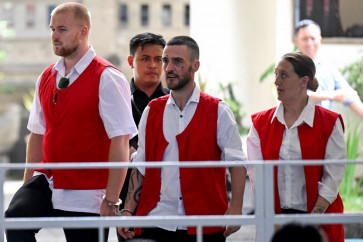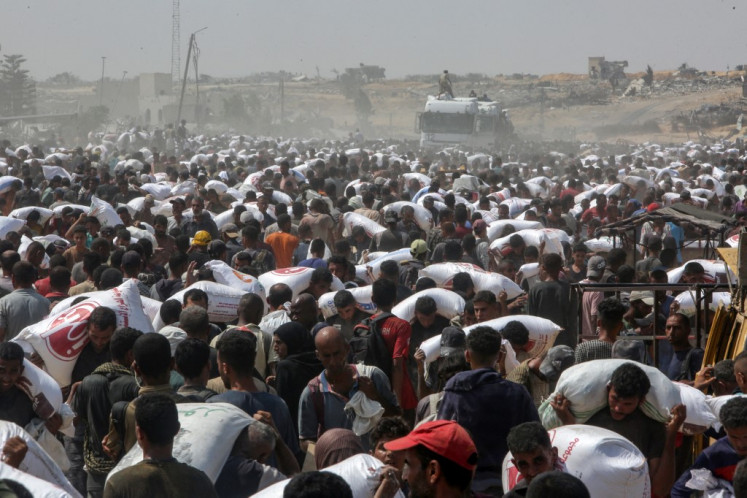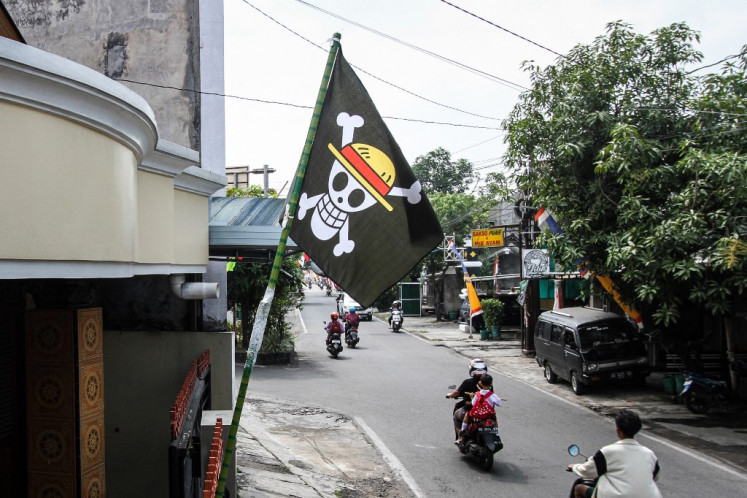Popular Reads
Top Results
Can't find what you're looking for?
View all search resultsPopular Reads
Top Results
Can't find what you're looking for?
View all search resultsNGOs raise missing rights in ASEAN draft
Following mounting pressure from activists on the lack of transparency, the ASEAN Intergovernmental Commission on Human Rights (AICHR) members met with the region’s civil society groups in Kuala Lumpur last week, to discuss the drafting of the ASEAN Human Rights Declaration (AHRD)
Change text size
Gift Premium Articles
to Anyone
F
ollowing mounting pressure from activists on the lack of transparency, the ASEAN Intergovernmental Commission on Human Rights (AICHR) members met with the region’s civil society groups in Kuala Lumpur last week, to discuss the drafting of the ASEAN Human Rights Declaration (AHRD).
The meeting went very well, according to activists, but worries over a weak draft that might provide poor human rights protection continued, as commission representatives did not share the draft declaration. However, the Commission members said the region’s foreign ministers had asked to review the draft first, according to Yuyun Wahyuningrum of the Human Rights Working Group (HRWG).
Human rights defenders have repeated concerns that the AHRD should not result in a document that is below the standards and principles of the Universal Declaration of Human Rights (UDHR).
Among 48 organizations from the region, the organizations represented in Kuala Lumpur also included Kalyanamitra, which focuses on women issues, the Commission for Missing Persons and Victims of Violence (Kontras) and the Jakarta Legal Aid Foundation (LBH Jakarta).
They jointly submitted their concerns and recommendations to the Intergovernmental Commission on Human Rights. The draft declaration of June 6, which followed the Comission’s sixth meeting in Yangon, Myanmar, a copy of which was obtained by The Jakarta Post, shows that earlier suggestions from the NGOs have not been accommodated.
Activists are particulary worried about references in the draft to national laws. Haris Azhar of KontraS said that the Commission “clearly wants to protect their countries’ judicial systems that may offend human rights”.
He cited Singapore’s Internal Security Act (ISA) and Malaysia’s Security Offenses (Special Measures) 2012 Act (SOSMA), which might be invoked by respective authorities to hold civilians without trial. Malaysian Prime Minister Najib Razak issued the SOSMA in April to replace its own infamous ISA.
Yuyun said references to “national laws” or “regional context” may undermine particular provisions. “It would be dangerous if a state justifies human rights violations with the use of such phrases,” she said.
In Kuala Lumpur, Yuyun also said she called on the commission for greater attention on rising trends of religious intolerance. The AHRD, she said, should guarantee freedom of religion and beliefs, including the freedom of individuals or communities, to express their faith in public or private.
The draft’s civil and political rights section mentions “freedom of thought, conscience and religion”, and critics said “beliefs” should also be included. “This region is also home to numerous non-denominational beliefs,” Yuyun said.
Critics also insist on including protection against forced disappearance amid past and present experiences in the region of countless people vanishing from the streets — not necessarily in conflict zones. Haris, the KontraS coordinator, said that although not all ASEAN member states had listed forced disappearance as a criminal offense in their national legislations, “the UN General Assembly has adopted the International Convention on the Protection of All Persons from Enforced Disappearances in 2006 and considered protection against the crime a non-derogable right.”
The latter convention was signed by Indonesia in 2010 and by Thailand in 2012. The Philippines is reportedly in the process of enacting a law on enforced disappearances. KontraS itself was set up following the kidnapping several of activists in the months of 1998, that proceeded the downfall of the Soeharto regime.
Other countries that have not ratified the convention on enforced dissapearances include Malaysia, Singapore and Brunei Darussalam. Activists and officials cite the judicial system in those countries as providing a legal basis for authorities to arrest without trial persons considered to be a danger to national security, through measures such as Singapore’s ISA.
The critics also had positive comments on the ASEAN draft declaration.
Yuyun praised its section on development, which includes the phrase “… the lack of development may not be invoked to justify the violations of internationally recognized human rights”.
The intergovernmental representatives were also convinced that the term “public morality’” should be taken out of the draft, she said.
— JP/Bagus BT Saragih
Crucial issues in draft of the ASEAN Human Rights Declaration (AHRD)
Contentious points:
“… the realization of human rights must be considered in the regional and national context bearing in mind different political, economic, legal, social, cultural, historical and religious backgrounds,” (General Principles, Point 7)
“In the realization of human rights and freedom ... the paramount principles of impartiality, objectivity, non-selectivity, non-discrimination, non-confrontation, and avoidance of double standards and politicization should always be upheld.” (General Principles, Point 9)
“…men and women of full age have the right to marry on the basis of their free and full consent, to find a family and to dissolve a marriage, as prescribed by law.” (Civil and Political Rights, Point 19)
“Every person has the right to freedom of thought, conscience and religion.” (Civil and Political Rights, Point 22). Note: non denominational beliefs not mentioned
“Every person has the right to form trade unions and join the trade union of his or her choice for the protection of his or her interests, in accordance with national laws and regulations.” (Economic, Social and Cultural Rights, Point 27)
Absent elements:
• Protection against enforced disappearances
• Clear and comprehensive protections for migrant workers
• Comprehensive protection for refugees, displaced persons and people with disabilities.
• Protection of people’s right to seek and to obtain asylum from persecution in other countries.
• Obligation of member nations to ensure that their laws, policies and practices conform with the declaration
• Comprehensive protection of indigenous peoples and traditional communities
• Protections to seek, receive and impart information through any media and regardless of international frontiers.
• Protection to meaningfully participate in all spheres of social and community life, including the political process, peace negotiations and decision-making in the public and the private spheres.
• Protection of political rights in elections.
• Protection of rights to a clean, healthy and sustainable environment.
Source: AHRD draft as of June 6, The Jakarta Post files/interviews










